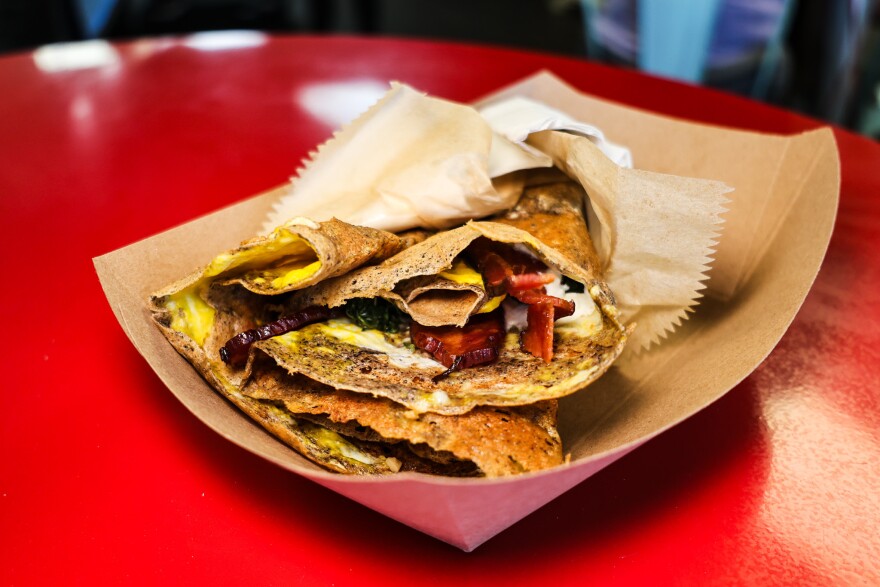In Boyne City, a little lakeside town in Northern Michigan, there’s a bakery offering crepes of a quality that you'd expect to find in France. It’s owned by a classically trained French baker, Gildas Berrou. The shop offers a variety of savory and sweet fresh-baked goods, including traditional crepes made to order.
Berrou’s made small adjustments to his offerings over the years and been open to suggestions. Well, most suggestions.
“One time I think we gave in and we put American cheese on a crepe for a customer,” he said. “Don't ask me how we had it in the bakery to begin with.”
The bakery serves staples including croissants, breads, crepes, soups, quiches, and more. The previous owner of the space ran a donut shop, and when Berrou took over, longtime customers expected donuts. But Berrou insisted on executing his own vision.
“And I said, ‘No, I'm going to keep it the way I'm doing it,’” he said. “And people were very, very open minded to try it.”

From France to Northern Michigan
Berrou showed an early interest in baking while growing up in Brittany, a northwestern region of France.
“I think the smell got me,” he said. “When I was a kid, I would visit my local baker and always bug him and bug him and bug him. And one day he asked my mom if I could go work with him at night.”
Berrou apprenticed as a baker when he was a teenager. Then, he traveled throughout France with the Compagnon du Devoir, a prestigious craftsmans’ guild, as part of his training to become a boulanger. He was working as a baker in Tel Aviv when he met his wife Tara, an American, while visiting family back in France.
Berrou first came to Boyne City to visit his in-laws. And he was surprised to find he loved it.
“It was so beautiful and so peaceful. I slept for three days. I mean, I was exhausted constantly with work,” he said. “And I said, ‘We’ve got to move to northern Michigan,’ because it's just unbelievably beautiful.”
Adapting a classic dish
One thing Berrou had to adapt to, he said, was American culture around bread.
“We [the French] get up every morning to go get bread,” he said. “And here [in America] we like to buy them and keep them for a few days or a week or so in the fridge and or on the counter. And that's not my culture.”
Gildas Lake Street Bakery is perhaps best known for their made-to-order buckwheat crepes. Like Berrou himself, the dish originated in Brittany, France.
“Just think of it as a mix of a taco and a pizza,” he said.

His favorite crepe – and a must-have at the bakery – is a Brittany classic: ham, egg, and cheese. Berrou keeps his batter recipe simple, with just buckwheat flour, water, and sea salt.
“Buckwheat is just a traditional bread from Brittany. That's what we used to eat three or 400 years ago when we were under the kings,” Berrou said. “The wheat we grew would go to the rich king families. Us peasants would have buckwheat to eat.”
The buckwheat provides a unique, nutty flavor compared to white flour.
“It's a bit harder to work that way, but it's pure buckwheat,” he said. “It's way, way better quality.”
And true to French tradition, Berrou uses his mom’s recipe that he learned growing up.
“If you talk to somebody from Brittany like me, they're going to tell you my mother or my grandmother's recipe is the best one, and it's the only one,” he said.
Berrou has mostly stayed true to his French roots, but has made some adjustments for his American audience. When making savory crepes, he scrambles the eggs rather than leaving them runny. And he’ll add ingredients the French might consider unusual.
“You [Americans] put bacon on everything,” he said, laughing. “Sometimes I look at you a bit dumbfounded because I'm not used to it. But it works.” Unlike American cheese, which he has vowed to never do again.
For the love of pastry
Gildas's story sounds like something straight out of a novel: hopping around the globe serving homemade crepes and pastries to locals wanting warm, fresh goods. But Gildas said it's a tough industry no matter where you're baking. Even in France, the future of the craft is “going downhill,” he said.
“It's much harder now than it used to be,” Berrou said. “And you really have to have people like me who want to do it. You're not doing it for the money. You're doing it because you like it.”

The work schedule doesn’t help, either. Berrou gets to the bakery at 2 a.m. five days a week – even during holidays.
“We work when people have fun,” he said. “The 4th of July is our busiest day of the year. All summer long, we're busy, you know? So it's hard to commit to that type of life.”
Berrou’s son, Killian, has considered following in his father’s footsteps. Right now, he works the grill making crepes.
“I've loved [working here] every single year,” he said. “It's probably one of the greatest things I've done”
Killian said he’s considered taking over the bakery when his dad retires, and maybe making his own changes.
“I love making mac and cheese,” he said. “So I feel like a mac and cheese-dedicated shop would be awesome. But I still want to do crepes, too.”
But that’s a long way off. Berrou is happy to continue making fresh-baked goods in the small vacation town.
Just don’t ask him to put American cheese on a crepe. The first time was painful enough.





![Gildas Berrou and his son, Killian, stand behind two crepe griddles. They've both committed to the life of a baker, which includes early morning hours and busy holiday seasons. "I've loved [working here] every single year," Killian said. "It's probably one of the greatest things I've done."](https://npr.brightspotcdn.com/dims4/default/ba24da6/2147483647/strip/true/crop/2048x1261+0+52/resize/880x542!/quality/90/?url=http%3A%2F%2Fnpr-brightspot.s3.amazonaws.com%2Fed%2Fb9%2F96588ff245fabd60314aa61b7eab%2Fgildaslakestreekbakery-edited-creditroniacabansag-20.jpg)











